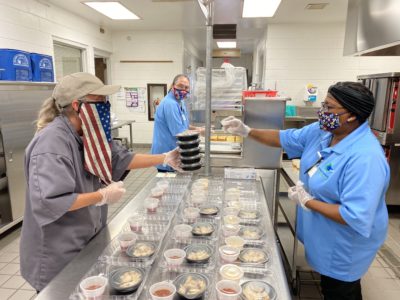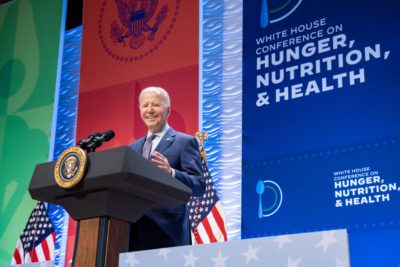
Share this story
|
|
“Not all heroes wear capes. Some wear aprons!” reads a post on the School Meals For All NC website.
The coalition and schools across the state celebrated School Lunch Hero Day on May 5, a day when advocates “celebrate the great work school nutrition professionals do every day across the state and the positive impacts they make on students.”
“School nutrition professionals are true heroes to students, teachers, and families,” said the post, noting “they rarely get the credit and thanks they deserve.”
One district drew the attention of local officials.
Mayor Bill Saffo of the City of Wilmington visited Williston Middle School. New Hanover County Schools posted pictures of the celebration on their Instagram.

“The day was a heartfelt recognition of our child nutrition staff’s passion and commitment to nutrition and learning,” said Eddie Anderson, assistant superintendent of New Hanover County Schools. “Their work is crucial to our students’ success and we’re grateful for the wide community support in recognizing them.”
The Carolina Hunger Initiative encouraged celebrating not just those serving lunch, but also heroes who serve breakfast, after school snacks and meals, summer meals, and more. Their website spotlights heroes from across the state, including Brunswick, Bertie, and Washington counties in the east, Guilford, Orange, and Wake counties in central North Carolina, and Transylvania County out west.
School Meals For All NC is a coalition that believes “no child should go hungry and every child in every public school in North Carolina should have access to breakfast and lunch at school at no cost to their families.”
Learn more about the coalition here. The coalition is working to get letters of support signed by advocates in all 100 counties. You can sign the letter here. You can register for coalition meetings here.
With legislature in session, sense of urgency builds
Unpaid student meal debt in North Carolina now exceeds $3.3 million, up from $1.3 million in November 2022.
For two school years during the pandemic, all students, regardless of income, could eat school meals for free. Before this, only students that met a certain income threshold qualified for free or reduced-price meals.
This ability to provide free school meals to students regardless of income was made possible by a U.S. Department of Agriculture waiver that allowed schools to serve meals to all students for free. This waiver used flexibility provided in the federal Seamless Summer Option (SSO) program, which allows schools to provide meals during the summer months for free if already enrolled in the National School Lunch or School Breakfast Program.
However, the waiver ended on June 30, 2022, right before the beginning of the 2022-2023 school year. At its height, this program was utilized by roughly 90% of school districts across the nation.
Since then, thousands of students across the state have charged their previously free meals to their school accounts. Many families, due to a number of challenges including but not limited to financial constraints, have not paid off these balances.
The state legislature extended free school lunch to students who qualify for reduced-price lunch for this school year, so this debt has accrued for students who do not qualify for reduced lunch.
“Food costs have skyrocketed for these families, and their dollar just can only stretch so far. As a result, these families depend upon meals at school, not just as a convenience, but as a safety net to guard against child hunger,” said Lynn Harvey, senior director of the Office of School Nutrition at the N.C. Department of Public Instruction.
Several bills have been introduced by the General Assembly this legislative session to reinstate school meals for all, but no action has been taken on them. The House’s budget proposal includes $7.8 million in non-recurring dollars to “satisfy any outstanding meal debt.”
Momentum is growing in other states: there are now five states (Minnesota, New Mexico, Maine, California, and Colorado) with permanent universal school meals and a handful that have extended the program through this school year.
There are students who do not qualify for free student meals but also can’t afford to pay for their food. Some of these students qualify for reduced-price meals, but with these meals, they are still required to pay a co-pay. Two state entities, the State Board of Education and Department of Public Instruction, have requested recurring funding in this year’s budget to get rid of the co-pay required for students who qualify only for reduced-price meals and not fully free meals. The state has covered the reduced-price copays for school breakfast since 2011.
P-EBT coming to an end
Another pandemic support program is ending at the end of this school year. The Pandemic EBT (P-EBT) program is a temporary support program that has been providing eligible families with food assistance throughout the COVID-19 pandemic. These benefits can be used at any stores that accept EBT and have helped support students.
Eligible K-12 students and young children that aren’t able to access free or reduced-price meals at school or child care centers due to COVID-19 related absences have benefited from this program by being able to use the support outside of the school cafeteria. The P-EBT benefits are on a debit-like card and are used at many authorized retailers, including several major grocery stores. For those that are eligible, P-EBT benefits are automatically added to P-EBT or Food and Nutrition Services cards.
Eligibility for the P-EBT program is still available for the summer of 2023, but the program will end at the end of the summer and will not be available for the 2023-2024 school year. At this point, there is no plan for renewal of the P-EBT program.
The last day for free or reduced-price meals eligibility for this school year is May 31, 2023. This is also the deadline for families to get attendance records approved for P-EBT.
You can check if your child is eligible for a one-time P-EBT benefit for this summer here.





